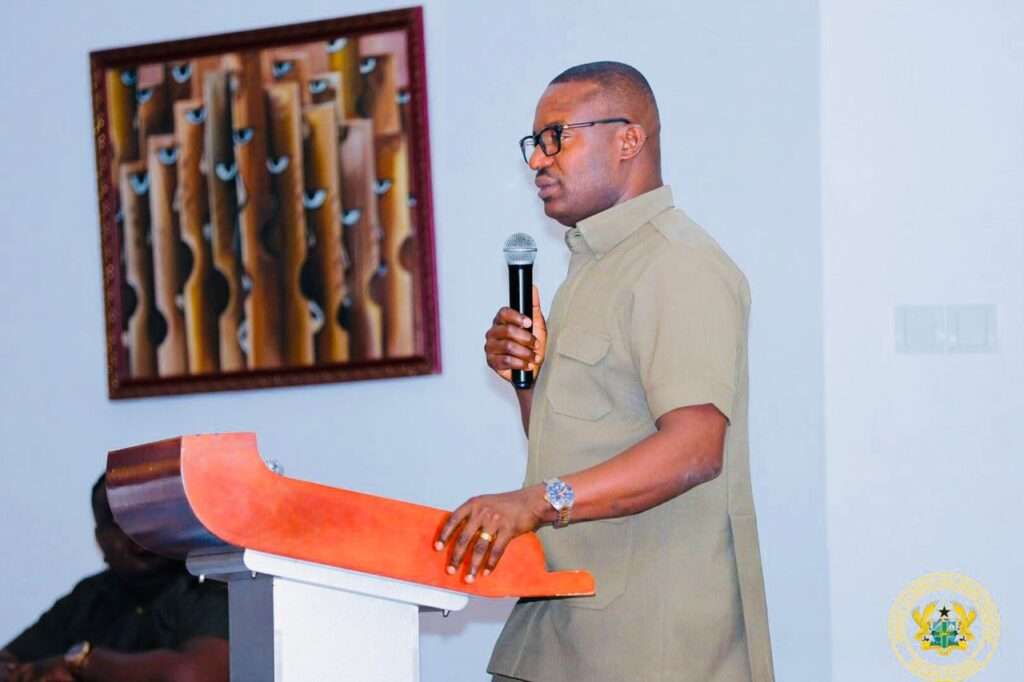The Minister of Energy and Green Transition, Hon. John Abdulai Jinapor, has reaffirmed the government’s commitment to streamlining operations within the Electricity Company of Ghana (ECG), enhancing private sector participation (PSP), and ensuring transparency in the power sector.
Speaking on key reforms at a meeting with officials of the International Monetary Fund (IMF) and the World Bank, the Minister emphasized that all revenue collections must be centralized into a single account before allocation. This measure, he noted, would enhance accountability and minimize inefficiencies.
“We have contractual obligations with service providers and acknowledge our commitments.
“However, deductions cannot be made arbitrarily. All funds must first be accounted for before we determine their distribution in an apportioned manner.”
Hon. John Abdulai Jinapor, Minister of Energy and Green Transition
The Minister revealed that the government has already engaged the World Bank in private sector participation in ECG operations, particularly in billing, collection, and system maintenance. He stressed that any company assigned a concession must handle all responsibilities within their designated area, including maintenance and fault repairs.
“If you are given an area, you must handle everything within that concession, collection, and maintenance.
“ECG will monitor operations to ensure efficiency. This is a better approach than a complete privatization.”
Hon. John Abdulai Jinapor, Minister of Energy and Green Transition
He assured that the entire process would be conducted transparently through a competitive tendering process.
“I do not want to interfere with how this is handled. Let us get the best model that works for us while learning from past experiences to avoid repeating mistakes.”
Hon. John Abdulai Jinapor, Minister of Energy and Green Transition
The private sector’s role will also extend to ensuring the timely maintenance and repair of the power distribution infrastructure. This, according to the Minister, will help in reducing the recurring problems of power outages and system failures that have impacted customers.
However, the government remains committed to retaining control and monitoring the overall functioning of the system, making sure that the private companies involved comply with the necessary standards.
Strategic Approach to Tariff Adjustments

One of the most pressing issues facing Ghana’s energy sector is the question of tariff adjustments. Given the country’s significant energy losses estimated to be around 40% the government recognizes the need for adjustments in tariffs.
However, Hon. Jinapor cautioned that tariff increases alone would not solve the sector’s problems if the inefficiencies in the system are not addressed first.
“No matter how much we adjust tariffs, it won’t make a difference unless we fix the inefficiencies in the system.”
Hon. John Abdulai Jinapor, Minister of Energy and Green Transition
The Minister also warned that excessive tariff hikes could have detrimental economic effects. Drawing on lessons from the impact of rising taxes, he noted that beyond a certain threshold, tariff increases could lead to diminishing returns.
“Beyond a certain threshold, excessive tariff hikes can lead to diminishing returns, as we have seen with taxation.”
Hon. John Abdulai Jinapor, Minister of Energy and Green Transition
The energy minister stressed the need for a balanced approach, ensuring that tariff adjustments are implemented gradually and strategically to avoid burdening consumers with unaffordable costs.
He also highlighted the volatile nature of foreign exchange fluctuations and their impact on power costs.
“We must balance revenue generation with economic stability.
“Automatic tariff increases could create major social and economic challenges.”
Hon. John Abdulai Jinapor, Minister of Energy and Green Transition
Hon. Jinapor’s comments point to the larger issue of balancing the financial sustainability of the power sector with the need for social stability. A rapid and unchecked increase in tariffs could incite public unrest, especially given the current economic pressures facing many Ghanaians.
To avoid this, the government is exploring a mix of strategies to address the underlying inefficiencies in the power sector while ensuring that necessary adjustments are made in a measured and responsible manner.
The Minister’s approach to centralized revenue collection, enhanced private sector involvement, and controlled tariff adjustments represents a strategic effort to improve Ghana’s energy sector.
By focusing on transparency, efficiency, and financial sustainability, the government aims to strengthen the ECG and ensure long-term energy security while avoiding unnecessary hardships for consumers.
READ ALSO: MTN Ghana Closes at GHS2.76 in Light Trading Session on the GSE



















